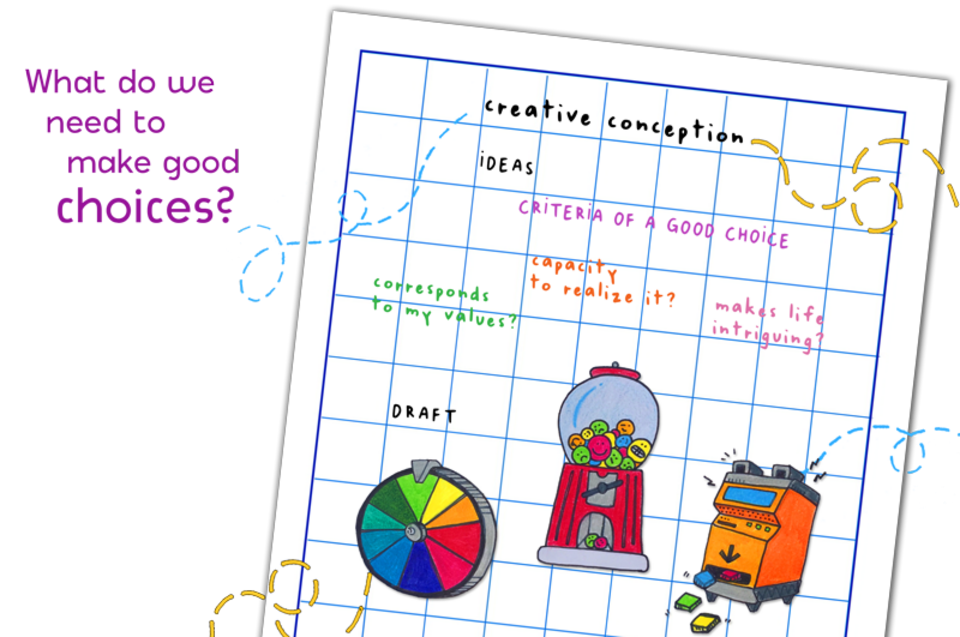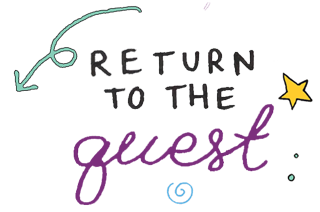
The choice dispenser (Part 1)
| Objective: To plan the creation of an amazing choice dispenser! |
Duration: 60 to 90 minutes
Material:
- A sheet of paper or cardboard
- Pencils and eraser
- Coloured pencils and markers
Instructions:
Do you find it difficult to make choices? Are you afraid of making bad decisions? Stop worrying! The choice dispenser is there for you! With the choice dispenser, you will always choose smarter!
...
- Prepare the sheet. Your mission will be to create an amazing choice dispenser! To help you get lots of ideas and organize them, prepare your sheet by drawing a horizontal line to separate it into two equal rectangles. In the top rectangle write "ideas" and in the bottom rectangle write "draft."
- Think about your first ideas. Write down all your ideas in the "ideas" section of your sheet, letting your imagination run wild, while considering the thinking prompts:
- What does the dispenser produce? Ask yourself what makes a good choice. How do you make good decisions? What do you need to consider? Should we consider the consequences of our actions... or make sure we have good intentions? Should we consider the particular context... or the people affected: ourselves, our friends, our family, or maybe even the world?
- What does the dispenser look like? Turn the different elements that can (or should) influence choices into smart buttons, levers or screens to program the choice dispenser, while imagining what the dispenser might look like. Would it be a complex machine that can evaluate millions of variables... or a simple wheel of fortune relying on chance?
- Sketch your ideas. Now that you've got a bunch of great ideas, it's time to see what they look like! In the “draft” area of your sheet, sketch your choice dispenser. It's not your final creation yet, so these drawings don't need to be too neat. It's mainly to see if your ideas work and to change them if necessary. You'll find that you'll have lots of new ideas as you start to create!
That's all for now! Don't forget that this activity is only the first part of your creative project! You can start the second part—Creative Construction—right after this one or after you've done the Philosophical Picnic, but we recommend that you at least take a break. You've earned it!
...
Bonus: Do all choices deserve the same attention? Should you choose an ice cream flavour just as carefully as you choose a political representative? To play with this idea, first imagine choosing an ice cream flavour as if you were choosing the next leader of a country. Then, imagine the opposite: that you have to choose a leader in the same way you would choose an ice cream flavour. What are the consequences of each of these situations? Are some decisions more important than others? How do you assess the importance of a decision? Hmm... Maybe you should design channels in the choice dispenser to rank each decision as more or less important... Unless you consider that all choices are equally important! Who knows: if the flapping of a butterfly's wings can cause a tornado, maybe your choice of ice cream will allow you to become president! |

| Tricks for tots: Making decisions can be very tiring! Some psychologists even talk about "decision fatigue" when you make worse decisions after having made too many decisions in a row. This fatigue can cause us to avoid making decisions or to make decisions without thinking. This is why some people have chosen to reduce the number of choices they have to make in a day, for example by wearing the same clothes every day, in order to save their precious energy for the decisions that really matter! Why don't you invent a special machine to make choices for you... and never feel tired! Start by making a list of the different choices you can make in a day, whether it's what to eat, what toy to play with or who to trust. Then imagine a machine that could make one of these choices for you, such as a snack vending machine, a smart toy box, or a radar for trustworthy humans. |
| Tips for teens: In philosophy, we call "free will" the ability to make a choice on your own without any influence other than your own preferences. This notion is at the centre of countless philosophical debates! While some thinkers claim that free will is part of human nature, or that it is necessary to presuppose it in order to assert a person's moral responsibility, others believe that the human will is determined by all sorts of individual and social factors, whether it be a person's physical and psychological limitations, or the influence and constraints of a group. For example, we may wonder whether a person born with genes predisposing them to chronic fatigue, in a family that never plays sports, in a city that provides no sports facilities to certain neighbourhoods, is really free to choose whether they "want" to play sports? In your opinion, do we have the freedom to make our own decisions? Do certain conditions, norms or social institutions affect our choices? To take your creative thinking further, think about what can increase or decrease the range of choices available to us, or our capability to make them. |
Share your creative reflections by sending them via email.
Include photos of your projects and notes of your thoughts, as well as your first name and your age!


